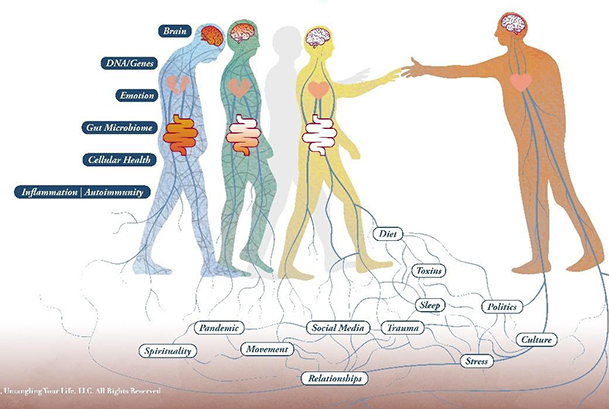Seeing the Whole Picture: How Integrative and Functional Medicine Clinicians Use Genomics for Improved Patient Outcomes

Seeing the Whole Picture: How Integrative and Functional Medicine Clinicians Use Genomics for Improved Patient Outcomes

Author: IntellxxDNA
One of the most frequent criticisms of traditional (or “conventional”) medicine is its focus on treating symptoms rather than understanding the underlying causes of illness and disease.
Functional medicine utilizes a different approach that values the innate power of the mind-body connection and focuses on the effects of factors like medication, environment, lifestyle and diet on patients’ health.
While functional medicine may be on the rise, many holistic healthcare providers aren’t considering genomics as a factor that could be influencing their patients’ health.
Defining Terms: Genetics Versus Genomics
According to the NIH, “genetics is the study of genes and their roles in inheritance – in other words, the way that certain traits or conditions are passed down from one generation to another.”1. In the field of molecular biology, “genomics is a more recent term that describes the study of all of a person’s genes (the genome), including interactions of those genes with each other and with the person’s environment.”2 Aiming to understand the relationship between genes and their functions in an organism, genomics involves the study of how genes are expressed and regulated and “includes the scientific study of complex diseases such as heart disease, asthma, diabetes, and cancer because these diseases are typically caused more by a combination of genetic and environmental factors than by individual genes.”3
How Genomics Works
By combining high-throughput sequencing technologies, bioinformatics, and computational analysis, precision medicine genomics is able to identify and characterize patients’ genes and their products, such as RNA and proteins. The ideal genomics platform will offer potential recommendations to modify gene function so patients can experience the long-awaited health changes they have been working towards. These potential recommendations can include dietary, lifestyle, environmental and even medication interventions that are uniquely targeted for the patient based on their genomics.
Incorporating genomics into your patient care plan is not a rejection of traditional medical treatments – the result is not a rejection at all. Instead, this approach gives you the opportunity to create patient plans that are targeted, personalized and evidence based so that you can incorporate all aspects of your patient’s health history into the treatment plan you create for them. Genomics allows functional medicine to work with the most clinically relevant genes and pathways involved in a large system of factors so that you can truly treat the whole patient.
Benefits of Precision Medicine Genomics
In addition to the information genomics provides for personalized patient care, this biological approach brings other new and expansive benefits to the field of integrative medicine. Here are a few examples of what genomics has to offer:
- Improved understanding of disease mechanisms: Genomics can identify the genes and pathways involved in disease development, providing insights into the underlying mechanisms of various diseases, such as cancer, diabetes, and neurodegenerative disorders.
- Biomarker discovery: Genomics can identify molecular markers that indicate the presence or progression of a disease, facilitating early detection and treatment.
- Drug discovery: Genomics can identify potential drug targets and help develop more effective and precise therapies.
“One of the most significant advantages of genomic testing for mental health is the ability to identify specific variations that may manifest symptoms in patients.”
Genomics for Mental Health
Genomic testing is a powerful tool that can help individuals and healthcare professionals identify potential opportunities for improving mental health. By analyzing an individual’s genetic code, genomic testing can provide insight into a person’s risk for certain mental health conditions and help guide treatment decisions.
One of the most significant advantages of genomic testing for mental health is the ability to identify specific variations that may manifest symptoms in patients. For example, certain variations have been linked to an increased risk for depression, anxiety, and other mental health conditions. By identifying these variations, healthcare professionals can take a more targeted approach to treatment, which can lead to better outcomes.
Additionally, genomic testing can also be used to identify potential drug interactions and side effects. Different individuals may respond differently to certain medications, and genomic testing can help identify patients who may be at a higher risk for certain side effects. This information can be used to make adjustments to treatment plans, which can help improve the overall effectiveness of therapy.
Environmental Factors
Another important aspect of genomic testing for mental health is the ability to identify potential environmental factors that may contribute to mental health conditions. For example, certain variations may make an individual more susceptible to the effects of stress, which can exacerbate symptoms of mental health conditions. By identifying these factors, healthcare professionals can work with patients to develop strategies for managing stress and other environmental factors that may be contributing to their symptoms.
IntellxxDNA
The convergence of traditional, functional and integrative medicine can be found within IntellxxDNA Reports.
IntellxxDNA personalized genomic reports help clinicians understand a patient’s individual gene function. Your clinician’s understanding leads to exceptionally powerful, individualized prevention and intervention strategies.
Reports are divided into categories of health conditions showing both risks and benefits. As a Clinical Decision Support Tool, you can use an IntellxxDNA Genomic Report to understand the clinically relevant and highly comprehensive information about your patient’s personal genetic make-up. This includes information about potential interventions that can be used to optimize their health and connect the dots that lead to optimal health.

IntellxxDNA Genomics LLC™ provides licensed health care professionals with accurate, accessible and actionable genomic intelligence to support cutting-edge clinical decision-making. Advanced research and proprietary methodology provide clinicians with comprehensive information regarding genomic insights, benefits and evidence-based, potential intervention strategies.
Created by clinicians for clinicians, IntellxxDNA focuses on gene-to-gene and gene-to-environment interactions through SNP technology. Data and analytics look at the complex intricacies of a patient’s genomic profile and how small variations within their DNA affect quality of life and health concerns for patients. To support clinical decision-making, evidence-based, well-researched potential intervention strategies – encompassing environment, lifestyle, nutrition, supplements and medications are included.

